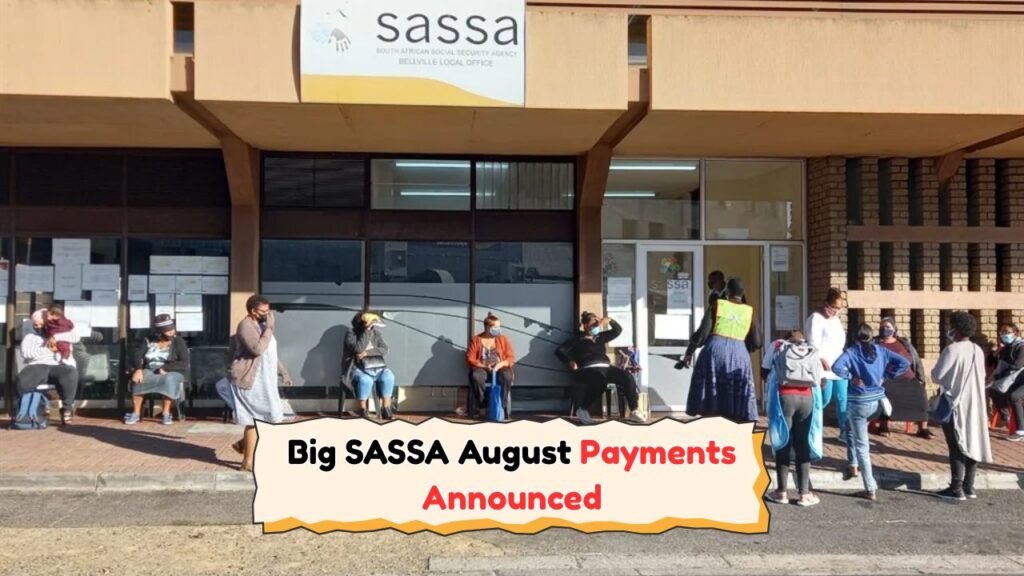August 2025 SASSA Grants: As South Africa continues to support its citizens through various welfare programs, the South African Social Security Agency (SASSA) plays a crucial role in providing financial assistance to those in need. With August 2025 approaching, many South Africans are keen to know if they qualify for the grants of R2,315, R560, or R1,250. Understanding the eligibility criteria and the application process is essential for anyone seeking financial aid during this time. The grants are designed to support different segments of the population, including the elderly, disabled individuals, and children, ensuring that vulnerable groups receive the help they need to lead a dignified life.

Understanding the Eligibility for SASSA Grants in August 2025
The eligibility criteria for the SASSA grants in August 2025 remain a focal point for prospective applicants. The agency has set clear guidelines to ensure that the funds reach those who genuinely require assistance. The R2,315 grant is typically aimed at senior citizens who have reached the age of 60 or older and do not have any other substantial source of income. Applicants must provide proof of age and financial status to qualify. On the other hand, the R560 grant is designed to assist children in need, specifically those under the age of 18 who are in foster care or have a parent receiving a pension. Meanwhile, the R1,250 grant targets individuals living with disabilities. To qualify, applicants must provide medical documentation confirming their disability and demonstrate that they are unable to earn a sustainable income due to their condition. By adhering to these eligibility guidelines, SASSA aims to ensure that funds are distributed fairly and effectively, supporting those who need it the most.
How to Apply for SASSA Grants in August 2025
Applying for SASSA grants in August 2025 is a straightforward process, but it requires careful attention to detail to ensure a successful application. Prospective applicants can begin by visiting the nearest SASSA office or accessing the official SASSA website to download the necessary forms. It is crucial to gather all required documentation, including identification documents, proof of income (or lack thereof), and any relevant medical records for disability grants. Submitting a complete and accurate application is essential, as any discrepancies may result in delays or rejection. Once the application is submitted, SASSA will review the documentation and notify the applicant of the outcome. For those who are unable to visit a SASSA office in person, the agency offers online application options, which have become increasingly popular due to their convenience and accessibility. By following the prescribed application process, eligible individuals can secure the financial support they need to navigate the challenges of daily life.
Common Challenges in SASSA Grant Applications
Despite the straightforward application process, many individuals encounter challenges when applying for SASSA grants. One common issue is the lack of proper documentation, which can significantly delay the application process. Applicants often underestimate the importance of providing complete and accurate information, leading to potential setbacks. Additionally, some individuals find the application forms overwhelming, especially those who are not familiar with bureaucratic procedures. To mitigate these challenges, SASSA offers support through community outreach programs and partnerships with local organizations that assist individuals in completing their applications. It is also advisable for applicants to double-check all forms and documents before submission to avoid unnecessary delays. By being proactive and seeking assistance when needed, applicants can enhance their chances of receiving timely financial support through SASSA grants.
The Impact of SASSA Grants on South African Communities
SASSA grants have a profound impact on South African communities, providing much-needed financial relief to vulnerable populations. The grants help alleviate poverty by ensuring that recipients can meet their basic needs, such as food, shelter, and healthcare. For many elderly citizens, the R2,315 grant offers a lifeline, enabling them to maintain a level of independence and dignity in their later years. Similarly, the R560 grant for children in foster care helps create a stable and nurturing environment, promoting their well-being and development. For individuals living with disabilities, the R1,250 grant provides critical support, allowing them to access necessary services and resources. Beyond individual benefits, SASSA grants contribute to the local economy by increasing purchasing power and stimulating demand for goods and services. This economic activity can lead to job creation and improved living standards within communities. Overall, SASSA grants play a vital role in fostering social and economic stability across South Africa.




